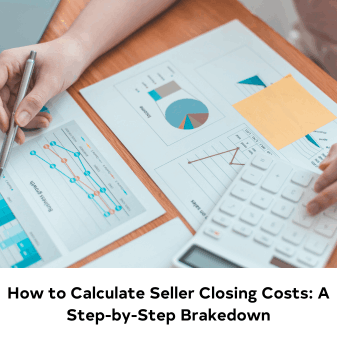Blog > How to Calculate Seller Closing Costs: A Step-by-Step Breakdown
How to Calculate Seller Closing Costs: A Step-by-Step Breakdown

Don't Let Closing Costs Catch You Off Guard!
Selling your home is an exciting milestone, but don't let unexpected closing costs rain on your parade. From agent commissions to transfer taxes, understanding these costs can save you from last-minute surprises. Let’s dive into a step-by-step breakdown of what you need to know about seller closing costs.
Real Estate Agent Commissions
Why It Matters: Real estate agent commissions are typically the largest chunk of closing costs for sellers.
How to Calculate: Commissions are usually 4-7% of the sale price, split between the buyer’s and seller’s agents.
- Example: If your home sells for $300,000, a 6% commission would be $18,000. Split between two agents, that's $9,000 each.
Tip: Negotiate commission rates with your agent to potentially lower this expense.
Remaining Mortgage Balance and Prepayment Penalties
Why It Matters: Any remaining balance on your mortgage needs to be paid off at closing.
How to Calculate: Obtain a mortgage payoff statement from your lender to find the exact amount.
- Prepayment Penalties: Check your mortgage terms to see if you’ll be charged for paying off your loan early.
Example: If you owe $150,000 on your mortgage and there’s a 2% prepayment penalty, you’d pay an additional $3,000.
Tip: Consult with your lender early to understand any penalties and plan accordingly.
Prorated Property Taxes
Why It Matters: As a seller, you’re responsible for property taxes up to the closing date.
How to Calculate: Calculate the daily tax rate and multiply by the number of days you own the home in the year up to the closing date.
- Example: Annual property tax is $3,600. Daily rate is $3,600/365 = $9.86. If closing is on June 30, you owe for 181 days. 181 x $9.86 = $1,784.66.
Tip: Use online calculators or consult with your real estate agent to get an accurate estimate.
Title Insurance
Why It Matters: Title insurance protects the buyer from any title disputes. Sellers often pay for this in many states.
How to Calculate: Costs vary, but typically range from $1500 to $3,000 for an average home in Utah.
Example: For a $300,000 home, expect to pay around $1600.
Tip: Shop around for title insurance to find the best rates.
Transfer Taxes
Why It Matters: Transfer taxes are fees for transferring ownership of the property.
How to Calculate: Rates vary by location. Typically, it’s a percentage of the sale price. For example Alaska, Idaho, Utah, and Texas do not have a transfer tax but in Washington you could pay a 1-3% transfer tax depending on the county.
-Example: If the transfer tax rate is 1%, for a $300,000 home, you’d pay $3,000.
Tip: Check local government websites or ask your real estate agent for the exact rates.
Attorney Fees
Why It Matters: Legal assistance is crucial to ensure all documents and transactions are properly handled.
How to Calculate: Fees typically range from $500 to $1,500 depending on the complexity of the sale.
Example: If your attorney charges $1,000 for their services, factor this into your closing costs.
Tip: Get quotes from several attorneys to compare rates.
Other Potential Fees
Why It Matters: Additional costs can add up quickly.
Examples:
- Home Warranty Fees: Offering a home warranty to the buyer can cost $400-$700.
- HOA Fees: Pay any outstanding Homeowners Association fees.
- Escrow Fees: Fees for the escrow company’s services, often split between buyer and seller.
Tip: Ask your agent for a detailed estimate of these additional costs early in the process


